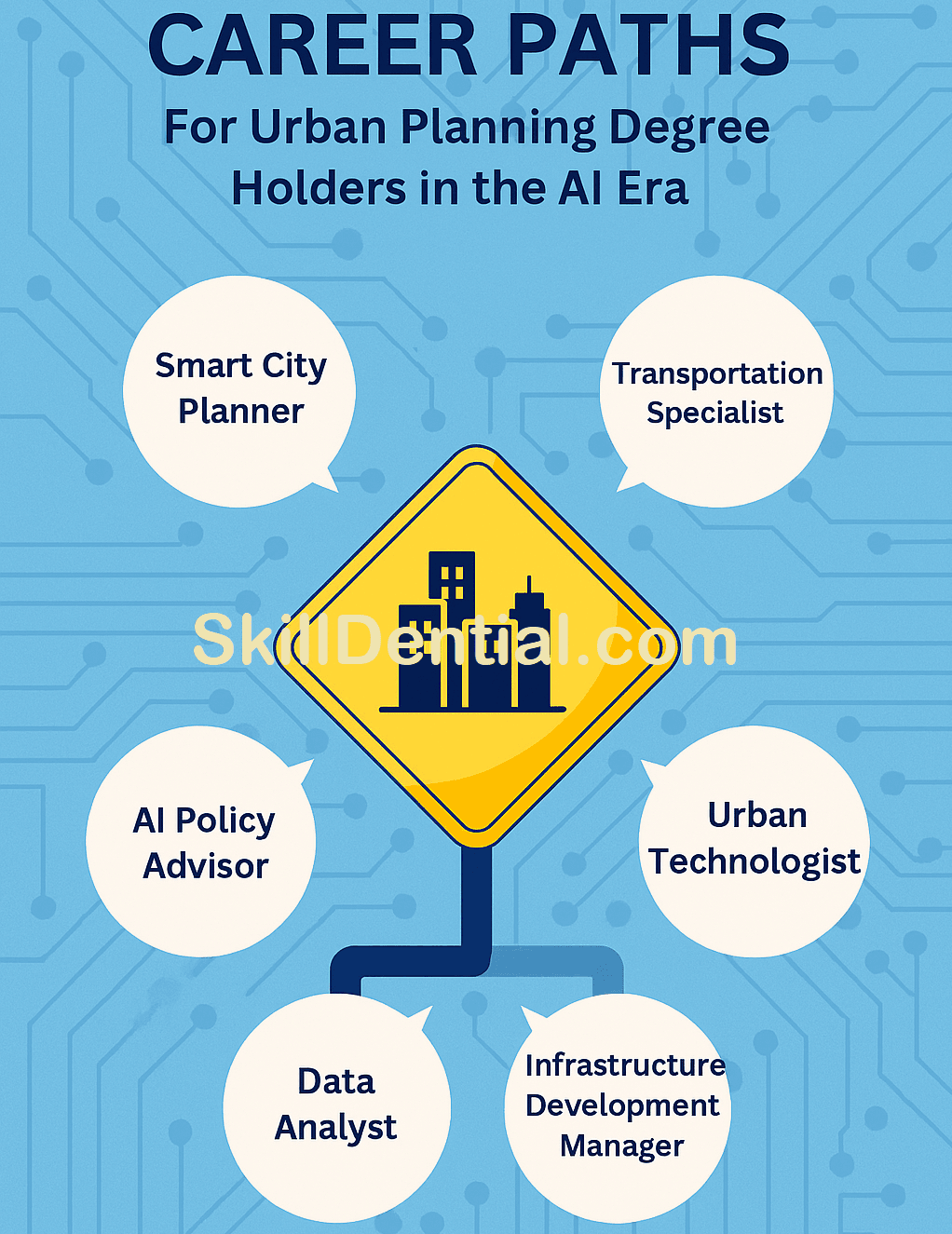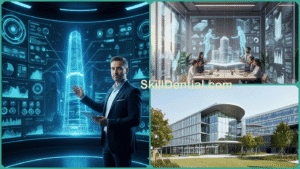Urban planning degree holders are increasingly well-positioned to thrive and succeed in the rapidly evolving job market that is being significantly shaped and transformed by the integration of AI technologies. Artificial intelligence enhances traditional urban planning processes by enabling advanced data analysis, sophisticated predictive modeling, and innovative generative design techniques, thereby opening up a wide range of new and exciting career paths.
Examples of these emerging roles include Urban Data Analyst, Smart City Technologist, and AI Policy Planner, all of which require specialized knowledge and skills. By actively acquiring and developing expertise in advanced Geographic Information Systems (GIS), programming languages such as Python and R, as well as cultivating strong ethical reasoning abilities, urban planners can ensure they remain highly competitive and well-prepared to meet the complex and evolving demands of the modern industry.
AI’s Role in Urban Planning
AI revolutionizes urban planning by leveraging vast datasets for informed decision-making, enabling predictive modeling of traffic, housing, and environmental factors with greater speed and accuracy than traditional methods. Innovations such as generative design allow the creation of optimized urban layouts that consider numerous variables simultaneously, enhancing city livability and sustainability.

Digital Twins offer real-time simulations of cities, helping planners foresee the impacts of proposed changes before implementation, which minimizes risks and resource waste. AI also automates routine regulatory compliance checks, freeing planners to focus on strategic community engagement and higher-level tasks.
Specific examples clearly highlight the significant advances made in this field: China’s prestigious Tsinghua University has developed an innovative AI urban design system that not only matches but actually outperforms human planners when it comes to designing concepts like the “15-minute city.” This system is capable of quickly optimizing a variety of neighborhood features, including parks, bike lanes, and other critical elements, making urban planning more efficient and effective.
Meanwhile, Singapore’s Digital Blue Foam has created the Urban Insights tool, which integrates a wide range of diverse data sources to enable rapid scenario testing and urban prototyping, allowing city planners to explore multiple development possibilities in a much shorter time frame.
Additionally, Digital Twins technology is being implemented in cities around the world, with notable projects in places like Wellington, New Zealand, and Shanghai, China. These Digital Twins provide dynamic visualization and predictive capabilities that serve as invaluable tools for guiding real-time city management and long-term planning decisions.
- AI’s role significantly extends to enhancing climate resilience by providing advanced tools such as Google’s Tree Canopy and IBM’s comprehensive carbon mapping initiatives. These technologies assist cities in strategically planning green infrastructure projects that not only help mitigate the adverse effects of extreme heatwaves but also contribute substantially to reducing overall carbon footprints.
- In the realm of infrastructure development, AI-assisted aerial mapping technologies play a crucial role in accurately identifying informal settlements and underserved areas. This precise identification enables more effective and targeted resource allocation for housing improvements and urban planning, as demonstrated by Colombia’s innovative MAIIA software platform.
- When it comes to fostering community engagement, AI-powered virtual reality (VR) and augmented reality (AR) applications create immersive and interactive experiences that encourage active public participation in urban development processes. Additionally, intelligent traffic management systems and urban safety applications powered by AI work together to enhance city mobility and improve security measures, making urban environments safer and more efficient for all residents.
While the potential of AI integration in urban planning is highly promising and offers numerous benefits, it also encounters several significant challenges that must be carefully addressed. These challenges include issues such as:
- The scarcity of reliable and comprehensive data
- Ongoing concerns about privacy protection
- The complex ethical implications involved in the use of sensitive citizen data
Urban planners are tasked with the critical responsibility of balancing the powerful capabilities of AI technologies with fundamental human values. This balance requires a strong commitment to ensuring transparency in AI processes, promoting equity across all communities, and fostering inclusiveness in AI-driven decision-making.
By consistently prioritizing and upholding these fundamental principles, urban planners can effectively build and strengthen public trust while simultaneously advancing and promoting social justice within various urban development initiatives and projects.
In Summary
AI revolutionizes urban planning by expanding its focus beyond mere data collection to encompass innovative design strategies, comprehensive environmental management, and enhanced citizen engagement. This transformation opens up a wide array of new opportunities for urban planners who possess both technical skills and a strong ethical foundation.
These professionals are now positioned to lead the development of smarter, more sustainable cities that effectively respond to the complex needs of growing urban populations while prioritizing long-term environmental health and community well-being.
Emerging Career Paths for Urban Planners

The integration of artificial intelligence in the field of urban planning is generating a diverse range of hybrid career pathways that combine traditional urban planning knowledge with advanced data science and cutting-edge technology skills.
This unique blend empowers professionals to address and manage the increasingly complex and multifaceted challenges posed by the development and management of future cities more effectively and innovatively. As a result, a variety of new and emerging career titles are becoming available to urban planning degree holders who possess proficiency in AI, including:
Smart City Planner
This role is dedicated to designing and managing urban environments by leveraging advanced technologies such as Internet of Things (IoT) devices and artificial intelligence (AI) analytics. The primary goal is to optimize various aspects of city life, including infrastructure development, transportation networks, and the delivery of public services, ensuring they are efficient and sustainable.
Professionals in this field need to have a strong understanding of sensor networks that collect real-time data, urban computing systems that process and analyze this information, and AI-driven decision-making tools that help in creating smarter, more responsive city solutions.
Urban Data Scientist/Analyst
This role involves managing and analyzing vast amounts of data collected from a wide range of urban sources, including traffic sensors, social media platforms, and environmental monitoring devices. The primary goal is to extract meaningful and actionable insights that can effectively guide city planning, policy-making, and development strategies.
Professionals in this position require advanced proficiency in programming languages such as Python and R, as well as specialized expertise in Geographic Information Systems (GIS) and machine learning techniques to handle complex datasets and provide accurate predictions.
AI Policy Planner
This role specializes in the development of comprehensive regulatory frameworks and ethical policies specifically designed to govern the deployment and integration of artificial intelligence technologies within urban environments.
It requires a deep and robust foundation in urban planning principles, combined with a thorough understanding of AI ethics, privacy laws, and governance structures. The AI Policy Planner is responsible for ensuring that AI implementations in cities align with societal values, legal standards, and promote equitable outcomes for all residents.
Digital Twin Specialist
This professional is responsible for creating and continuously maintaining highly detailed virtual models of urban environments, known as Digital Twins. These sophisticated digital replicas simulate real-time changes and dynamics affecting infrastructure and various city systems, providing an accurate and up-to-date representation of the urban landscape.
The specialist utilizes advanced AI-powered modeling techniques to analyze data and predict outcomes, playing a crucial role in supporting effective crisis management, innovative urban design, and comprehensive sustainability planning initiatives.
Sustainable Urban Technologist
This role involves developing advanced AI-driven solutions specifically designed to address critical environmental goals such as reducing carbon emissions, enhancing green infrastructure, and improving climate resilience within urban settings.
Professionals in this career path combine in-depth knowledge of urban planning principles with cutting-edge AI applications to effectively monitor environmental conditions and optimize the use of natural and built resources. Their work supports the creation of smarter, more sustainable cities that can adapt and thrive in the face of environmental challenges.
In Summary
These roles are highly relevant across sectors, including municipal governments, private urban tech firms, research institutions, and non-profit organizations focused on smart city initiatives. Emerging job listings for urban planners with AI skills show demand for professionals who can use AI tools for predictive analytics, drone data processing, and generative design, emphasizing the need for continuous learning through specialized courses and certifications.
Continued and consistent upskilling in advanced GIS technologies, programming languages such as Python and R, cutting-edge AI tools, and the responsible, ethical application of artificial intelligence will significantly empower urban planners.
This ongoing professional development will enable them to secure these future-proof and highly sought-after roles while making substantial and meaningful contributions to the creation of smarter, more equitable, and highly sustainable cities that can effectively meet the challenges of tomorrow.
Essential Skills for Urban Planning in the AI Era
Urban planners aiming to succeed and thrive in the rapidly evolving AI era need to develop and cultivate a well-rounded and balanced combination of both technical expertise and essential soft skills. This diverse skill set is crucial for effectively navigating the ever-growing complexity of urban environments as well as adapting to increasingly technology-driven workflows and decision-making processes.
Technical skills that are absolutely vital and essential for successfully performing in this continuously evolving and rapidly changing role include the following:
- Demonstrates advanced proficiency in Geographic Information Systems (GIS), enabling the effective analysis and visualization of complex spatial data. This expertise allows for the creation of detailed maps, spatial models, and comprehensive data interpretations that support informed decision-making processes across various applications and industries.
- Programming in versatile languages such as Python and R, which are extensively used for conducting advanced data analysis, developing sophisticated predictive modeling techniques, and performing various automation tasks efficiently and effectively.
- Extensive familiarity with advanced AI-powered generative design and simulation tools that significantly assist in the development of optimized, highly efficient, and data-driven urban layouts for modern city planning.
- Extensive expertise in data visualization techniques to effectively communicate complex and multifaceted urban data in a clear and intuitive manner to a diverse range of stakeholders. This ensures that intricate information is easily understood, facilitating informed decision-making and collaborative planning processes.
- Comprehensive knowledge of Building Information Modeling (BIM) integrated with advanced artificial intelligence (AI) technologies to significantly enhance the planning, design, and management of infrastructure projects. This combination allows for more efficient, accurate, and innovative approaches to infrastructure development, optimization, and maintenance throughout the entire project lifecycle.
Soft skills are just as essential and play a crucial role in personal and professional success:
- Demonstrates strong and well-developed ethical reasoning skills essential for effectively identifying and addressing various biases present in AI datasets, while actively advocating for fair and equitable urban solutions that promote social justice and inclusivity across diverse communities.
- Advanced complex problem-solving skills are essential for effectively integrating a wide range of diverse urban systems and successfully addressing multifaceted planning challenges that arise in dynamic city environments. These skills enable professionals to analyze interconnected components, devise innovative solutions, and implement strategies that accommodate the complexity and variability inherent in urban planning scenarios.
- Clear and effective communication is essential to successfully engage a wide variety of stakeholders, ranging from policymakers and government officials to local community members and grassroots organizations. This involves tailoring the message to suit different audiences, ensuring that complex information is presented in an accessible and understandable manner, and fostering open dialogue that encourages participation and collaboration across diverse groups.
- Extensive project management capabilities designed to effectively lead and coordinate cross-disciplinary, collaborative initiatives that seamlessly integrate advanced technology and specialized planning expertise. These skills enable the successful execution of complex projects by fostering teamwork across diverse fields and ensuring strategic alignment throughout the process.
Building these competencies demands ongoing professional development including specialized certifications, workshops, and hands-on application with relevant software. Emerging AI-powered tools are accelerating tasks such as site analysis and zoning compliance, but planners must leverage these alongside human judgment and stakeholder input to ensure socially responsive outcomes.
Human-AI collaboration in planning workflows is rapidly becoming the standard practice across various industries, which means that developing proficiency in accurately interpreting AI-generated outputs and effectively integrating them into inclusive, policy-driven decision-making processes is absolutely indispensable for success.
In Summary
Success for urban planners in the rapidly evolving AI era depends heavily on being not only technically adept but also ethically grounded, highly communicative, and adaptable to continuous learning and change. These essential qualities empower planners to effectively harness AI as a powerful and transformative tool, enabling the creation of sustainable, equitable, and thriving urban futures that meet the complex needs of diverse communities.
Ethical and Social Implications of AI in Urban Planning
The deployment of AI in urban planning raises significant ethical and social concerns that must be addressed to ensure technology benefits all communities equitably. A primary issue is the risk of bias in AI systems, which often reflect and perpetuate existing societal inequalities, disproportionately impacting marginalized groups. Without diverse and inclusive datasets, AI-driven decisions can reinforce disparities in housing, transportation access, and resource distribution.
Transparency and accountability are critical, as many AI algorithms operate as “black boxes,” making decision processes difficult to understand or challenge by both planners and the public. This opacity undermines democratic oversight and community trust in urban planning decisions influenced by AI. Privacy risks are heightened by the extensive data collection inherent in smart city technologies, raising concerns about surveillance, data misuse, and breaches of individual confidentiality.
To mitigate these risks, urban planners must uphold core humanistic and ethical values such as inclusivity, fairness, and community participation. Engaging diverse stakeholders in the development and deployment of AI tools fosters trust and ensures that AI augments rather than replaces critical human judgment. Ethical AI implementations should prioritize transparency by providing understandable explanations of AI-driven decisions, robust data protection policies, and proactive public engagement to demystify AI technologies.
In Summary
Ethical AI integration in urban planning demands a careful and thoughtful balance between leveraging the numerous technological benefits that AI offers and steadfastly protecting crucial values such as equity, privacy, and social justice.
Urban planners have a vital and indispensable role to play as dedicated guardians of these core principles, working diligently to ensure that AI technologies contribute positively to creating sustainable, resilient, and truly inclusive urban futures.
At the same time, they must remain consistently vigilant and proactive in identifying, understanding, and effectively addressing the complex, multifaceted, and inherent ethical challenges that inevitably arise with the widespread adoption and integration of AI technologies in city planning and urban development processes.
FAQs
What jobs can I get with an urban planning degree in the AI era?
Urban planning degrees now open doors to hybrid roles like Smart City Planner, Urban Data Scientist/Analyst, AI Policy Planner, Digital Twin Specialist, and Sustainable Urban Technologist. These roles blend planning expertise with data science and AI technology, and they are found across public, private, and non-profit sectors.
Which coding languages should urban planners learn?
Python and R stand out as the most valuable and widely used programming languages for a variety of tasks such as data analysis, predictive modeling, artificial intelligence applications, and automation processes, particularly within the context of urban planning workflows. Their versatility and extensive libraries make them essential tools for professionals working in this field.
How does AI impact traditional urban planning tasks?
AI automates routine, data-heavy activities such as GIS analysis, traffic modeling, zoning compliance checks, and environmental impact assessments, freeing planners to focus on complex strategic planning and community engagement tasks.
What ethical issues should urban planners consider with AI?
Planners need to address data bias that could worsen inequalities, ensure AI transparency to avoid opaque decision-making, protect privacy in extensive data collection, and prioritize social equity to maintain public trust.
How can mid-career planners upskill for the AI era?
Mid-career planners should pursue continuous education in advanced GIS, programming (Python, R), AI-powered design and simulation tools, and ethics workshops while maintaining foundational urban planning skills to stay relevant in the evolving job market.
In Conclusion
The convergence of AI and urban planning opens exciting, future-oriented career opportunities that blend technology, data science, and traditional planning expertise. As cities become smarter and more complex, urban planners who embrace AI tools and develop skills in coding, advanced GIS, ethical reasoning, and data analytics will be at the forefront of designing sustainable, equitable, and resilient urban futures.
While artificial intelligence automates a wide range of technical tasks and processes, it simultaneously increases the importance of planners serving as ethical stewards. These professionals must act responsibly and thoughtfully to ensure technology is used in ways that benefit society.
Additionally, planners need to be highly effective communicators, capable of bridging the gap between complex technological advancements and the diverse needs of the community. This dual role is essential for creating solutions that are both innovative and socially responsible.
By continuously upskilling and engaging with emerging AI innovations responsibly, urban planners can transform potential anxieties about automation into enthusiasm for impactful, innovative careers that shape the cities of tomorrow. The future of urban planning is not just digital—it’s profoundly human-centered and opportunity-rich.
Discover more from SkillDential
Subscribe to get the latest posts sent to your email.


